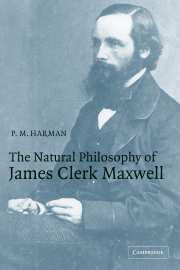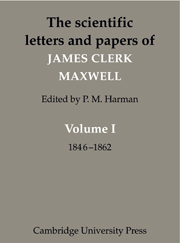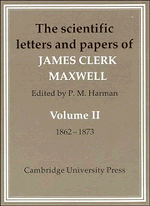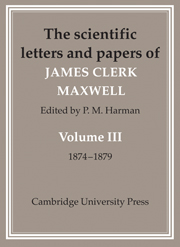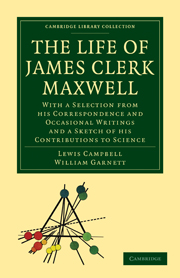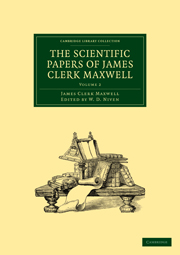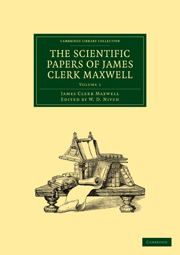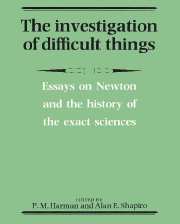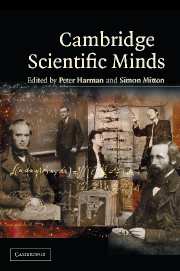The Natural Philosophy of James Clerk Maxwell
£22.99
- Author: P. M. Harman, Lancaster University
- Date Published: February 2001
- availability: Available
- format: Paperback
- isbn: 9780521005852
£
22.99
Paperback
Other available formats:
Hardback
Looking for an inspection copy?
This title is not currently available on inspection
-
This book provides an introductory yet comprehensive account of James Clerk Maxwell's (1831–79) physics and worldview. The argument is structured by a focus on the fundamental themes which shaped Maxwell's science: analogy and geometry, models and mechanical explanation, statistical representation and the limitations of dynamical reasoning, and the relation between physical theory and its mathematical description. This approach, which considers his physics as a whole, bridges the disjunction between Maxwell's greatest contributions: the concept of the electromagnetic field and the kinetic theory of gases. Maxwell's work and ideas are viewed historically in terms of his indebtedness to scientific and cultural traditions, of Edinburgh experimental physics, and of Cambridge mathematics and philosophy of science, which nurtured his career.
Read more- The most important physicist in the two centuries separating Newton and Einstein
- Based on a full range of published and manuscript sources
- A comprehensive interpretation of Maxwell's physics, accessible to the non-specialist
Reviews & endorsements
'By stressing the deep traditionalism of Maxwell's enterprise, Harman makes him a participant in a philosophical conversation about matter, motion and mind, well-established by the time of Newton and continuing into this century.' Simon Schaffer, London Review of Books
See more reviews'The sections on Maxwell's physics in this book are presented with admirable clarity, particularly the intricacies of how his theory of electromagnetism developed, which are usually difficult to follow. This presentation gives the general reader a clear overview of Maxwell's work, while the discussion of how Maxwell's physics developed with time provides a good insight into how philosophical ideas matured.' Elizabeth Garber, Physics World
'… not the least of his talents is his ability to present brief, informed, and intelligible, accounts of the results of such analysis and use them in his argumentation.' Ole Knudsen, Centaurus
'The book is wonderfully informative and insightful throughout; its merit lies as much in stimulating questions as in providing answers.' Daniel Siegal, American Scientist
''Natural Philosopher' probably captures as much of Maxwell as any single label can, and Harman is to be commended for bringing a measure of synthesis to our picture of one of the most important but elusive figures of Victorian science.' Bruce J. Hunt, Book Reviews - Isis, 91
'James Clerk Maxwell (1831–1879) belonged to the 'golden age' of classical physics and contributed to many of its great achievements … In addition to the philosophical focus of the text, the book is full of interesting historical detail, and is very fully annotated; it would be enjoyed by anyone with a scholarly interest in the history of physics in the 'golden age'. C. W. P. Palmer, Contemporary Physics
Customer reviews
Not yet reviewed
Be the first to review
Review was not posted due to profanity
×Product details
- Date Published: February 2001
- format: Paperback
- isbn: 9780521005852
- length: 248 pages
- dimensions: 229 x 153 x 20 mm
- weight: 0.406kg
- contains: 10 b/w illus.
- availability: Available
Table of Contents
Preface
1. Introduction: Maxwell and the history of physics
2. Formative influences
3. Edinburgh physics and Cambridge mathematics
4. Physical and geometrical analogy
5. Models and mechanisms
6. Dynamical and statistical explanation
7. Geometry and physics
8. Physical reality: ether and matter
9. Physics and metaphysics.
Sorry, this resource is locked
Please register or sign in to request access. If you are having problems accessing these resources please email [email protected]
Register Sign in» Proceed
You are now leaving the Cambridge University Press website. Your eBook purchase and download will be completed by our partner www.ebooks.com. Please see the permission section of the www.ebooks.com catalogue page for details of the print & copy limits on our eBooks.
Continue ×Are you sure you want to delete your account?
This cannot be undone.
Thank you for your feedback which will help us improve our service.
If you requested a response, we will make sure to get back to you shortly.
×
